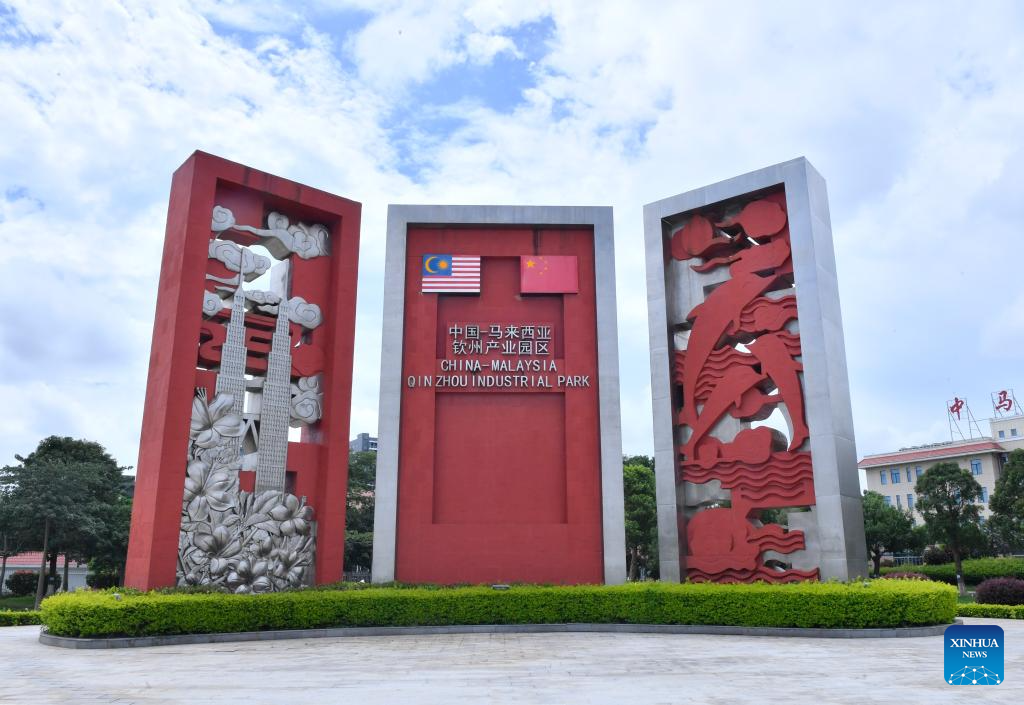
The pioneering "Two Countries, Twin Parks" model between China and Malaysia is embracing new upgrades, as both sides push for deeper industrial integration, smarter supply chains and digital-driven growth to power development, officials and industry insiders say.
Established 12 years ago, the Malaysia-China Kuantan Industrial Park in Pahang state and the China-Malaysia Qinzhou Industrial Park in the Guangxi Zhuang autonomous region have jointly developed this innovative model, injecting fresh vitality into the high-quality joint development of the Belt and Road Initiative.
"I have personally witnessed the industrial park grow from small to big, and every day there are new changes happening there," said Muhammad Nur Azri, an operations manager at the deep-water port near the Kuantan Industrial Park.
READ MORE: Bilateral trade helps China-Malaysia ties
Officials and industry insiders said the two countries are now poised to upgrade the initiative and further promote trade and investment facilitation, a move that will inject new momentum into regional prosperity.
Lu Xinning, vice-chairman of Guangxi, said the "Twin Parks "model was the first of its kind between China and the Association of Southeast Asian Nations, pioneering national-level industrial parks and setting a benchmark for regional cooperation.
A direct container shipping route between Qinzhou Port and Kuantan Port has been in operation since 2017.Last year, bilateral trade between China and Malaysia reached a record $212.03 billion, according to China's Foreign Ministry.
As of December, the first phase of the Qinzhou park had attracted 345 projects, generating an industrial output of 106 billion yuan ($14.55 billion) and foreign trade volume of 45.14 billion yuan. The park has also utilized about $822 million in foreign investment.
At Kuantan Port, operational capacity has expanded, with new terminals boosting throughput — the deep-water port's two 150,000-ton-class berths now handle nearly 10 million tons of bulk cargo annually.
"The two parks continue to draw robust investment interest, with an increasing number of enterprises establishing operations there," said Zuo Kongtian, deputy director of the administrative committee of Qinzhou Industrial Park.
"Looking ahead, the China-Malaysia 'Two Countries, Twin Parks' Joint Cooperation Council will be further leveraged to deepen policy coordination and spur innovation," Zuo said. "Efforts will focus on advancing the integrated development of both parks, easing cross-border flows of trade, investment, finance, logistics, the digital economy and talent."
Unique advantages
Lu highlighted Guangxi's unique advantages in geographical location, industrial platforms and supportive policies, which position it as a key hub linking China and ASEAN industrial and supply chains.
Both sides should work together to build more resilient cross-border industrial and supply chains to withstand global uncertainties, she said. Efforts should also be made to advance trade and investment facilitation, ensuring free and efficient flow of goods, capital, technology, and talent, so that cooperation can extend globally and benefit more communities, she added.
Lu also called for accelerating the application of AI to empower industrial development, seizing emerging opportunities in AI and exploring the joint creation of a China-Malaysia "Two Countries, Twin Parks" digital special zone.
ALSO READ: BRI railway to better link Malaysia
Chong Sin Kiat, director of the Kuantan Industrial Park, said that under the "Two Countries, Two Parks" cooperation framework, China and Malaysia are pushing forward policy innovation and working hand in hand to inject fresh momentum into the rapid growth of their partnership.
"Both sides are encouraging leading Malaysian companies to expand into the Qinzhou park and welcoming Chinese firms with capacity advantages to invest in the Kuantan park, fostering mutual growth," Chong said.
These initiatives are expected to help enterprises dive into ASEAN markets while boosting local economic development. They also aim to strengthen the region's capacity to navigate rising protectionism and unilateralism, fostering shared prosperity across participating countries, he said.
Contact the writers at liujianqiao@chinadaily.com.cn


